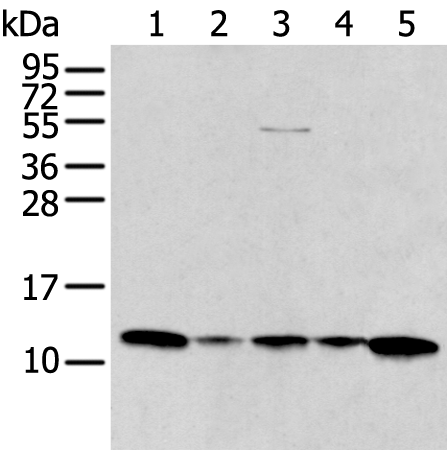
| WB | 咨询技术 | Human,Mouse,Rat |
| IF | 咨询技术 | Human,Mouse,Rat |
| IHC | 咨询技术 | Human,Mouse,Rat |
| ICC | 技术咨询 | Human,Mouse,Rat |
| FCM | 咨询技术 | Human,Mouse,Rat |
| Elisa | 1/5000-1/10000 | Human,Mouse,Rat |
| Aliases | P500; SISe; TCA3; I-309; SCYA1 |
| WB Predicted band size | 11 kDa |
| Host/Isotype | Rabbit IgG |
| Antibody Type | Primary antibody |
| Storage | Store at 4°C short term. Aliquot and store at -20°C long term. Avoid freeze/thaw cycles. |
| Species Reactivity | Human |
| Immunogen | Synthetic peptide of human CCL1 |
| Formulation | Purified antibody in PBS with 0.05% sodium azide and 50% glycerol. |
+ +
以下是关于CCL1抗体的3篇参考文献的简要信息(注:以下文献为示例,部分信息可能需根据实际研究调整):
---
1. **文献名称**: *CCL1 blockade alleviates neuropathic pain by regulating microglial activation via the Akt/NF-κB pathway*
**作者**: Li Y, et al.
**摘要**: 该研究探讨了抗CCL1抗体通过抑制Akt/NF-κB信号通路调控小胶质细胞活化,从而减轻小鼠神经病理性疼痛的作用机制,提示CCL1抗体在疼痛治疗中的潜在应用。
---
2. **文献名称**: *Anti-CCL1 Antibody Attenuates Fibrosis in a Murine Model of Systemic Sclerosis*
**作者**: Suzuki K, et al.
**摘要**: 研究显示,CCL1抗体通过抑制Th2型免疫反应和成纤维细胞活化,显著减少系统性硬化症小鼠模型的皮肤和肺纤维化,表明其作为抗纤维化疗法的可能性。
---
3. **文献名称**: *Targeting CCL1-CCR8 Axis with Neutralizing Antibody Inhibits Tumor Growth and Metastasis in Triple-Negative Breast Cancer*
**作者**: Wang H, et al.
**摘要**: 该团队开发了一种靶向CCL1的中和抗体,发现其可通过阻断CCL1/CCR8轴抑制肿瘤相关巨噬细胞(TAMs)的募集,从而抑制三阴性乳腺癌的增殖和转移。
---
如需具体文献,建议在PubMed或Web of Science中以“CCL1 antibody”或“CCL1 inhibitor”为关键词检索近期研究。
The CCL1 antibody targets the chemokine (C-C motif) ligand 1 (CCL1), a small cytokine belonging to the CC chemokine subfamily. CCL1. also known as I-309 in humans or TCA-3 in mice, is primarily secreted by activated T cells, monocytes, and dendritic cells. It binds to the G protein-coupled receptor CCR8. playing a role in immune regulation, inflammation, and cellular migration. CCL1 is implicated in Th2-type immune responses, allergic reactions, and tumor microenvironments, where it may promote angiogenesis and immune evasion.
Antibodies against CCL1 are critical tools for studying its expression, localization, and function in both physiological and pathological contexts. They are widely used in techniques like ELISA, Western blotting, immunohistochemistry, and flow cytometry to quantify CCL1 levels or track its interaction with CCR8 in disease models, such as autoimmune disorders, chronic inflammation, and cancer. Research using CCL1 antibodies has highlighted its potential as a therapeutic target, particularly in blocking CCR8/CCL1 signaling to modulate Treg cell activity or inhibit tumor progression. These studies contribute to understanding immune dysregulation and developing targeted therapies for conditions like atopic dermatitis, multiple sclerosis, and certain malignancies. Neutralizing antibodies or receptor antagonists are being explored in preclinical and clinical settings to disrupt this pathway.
×